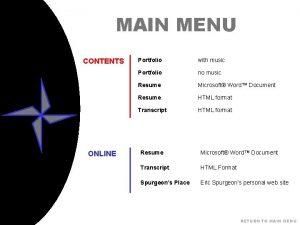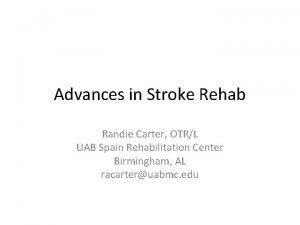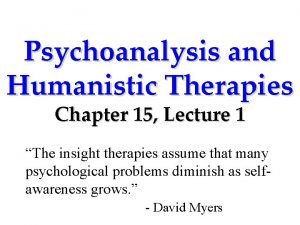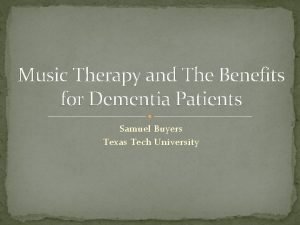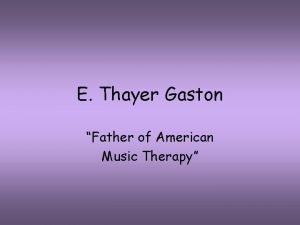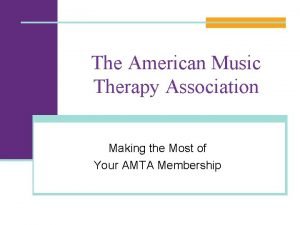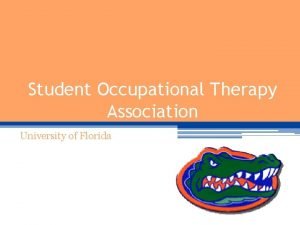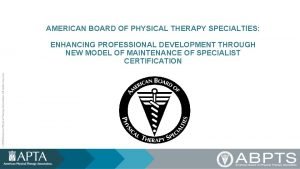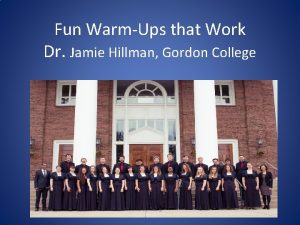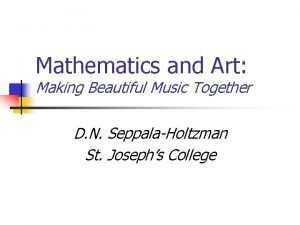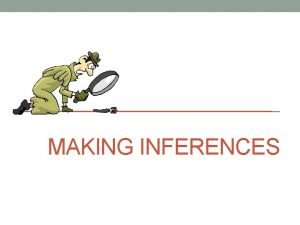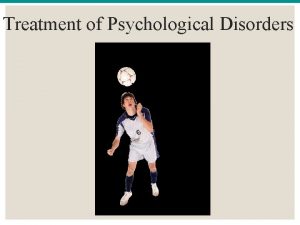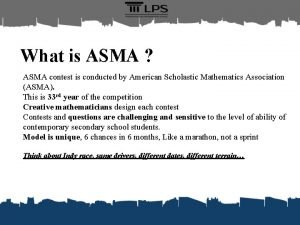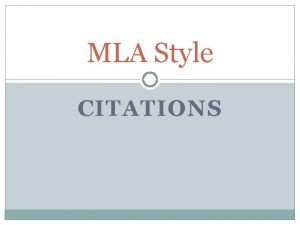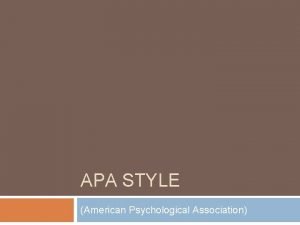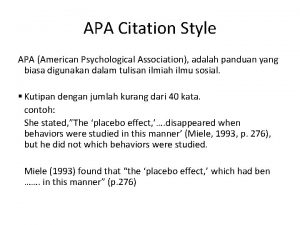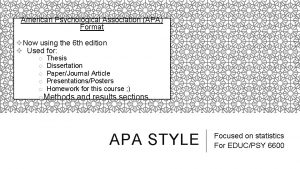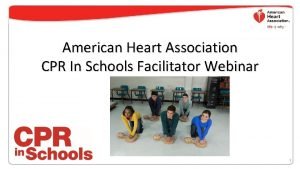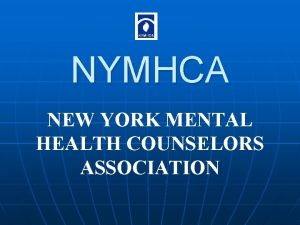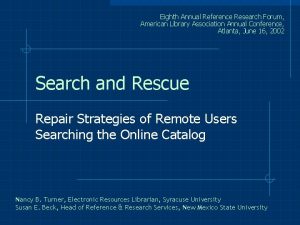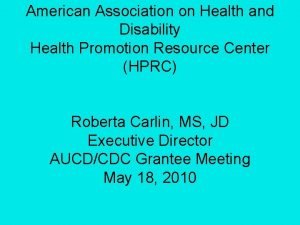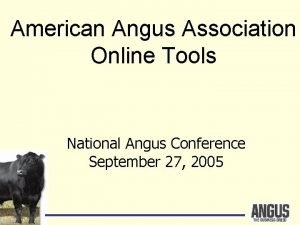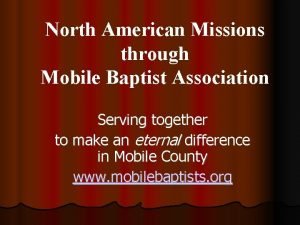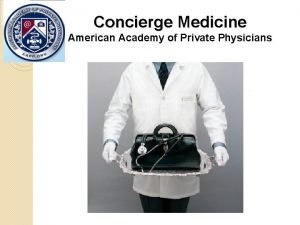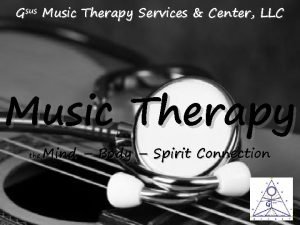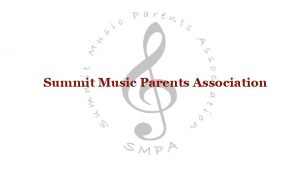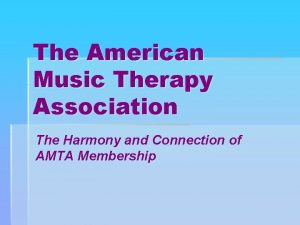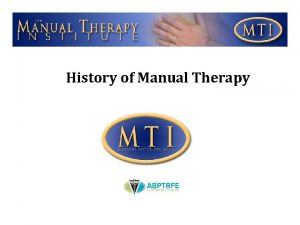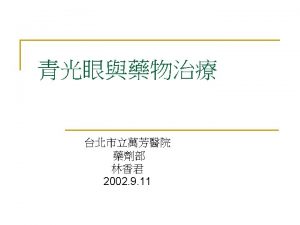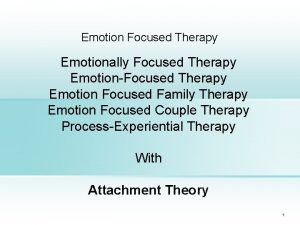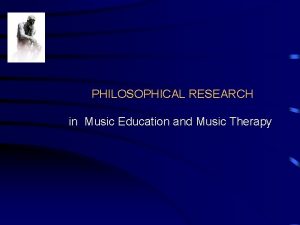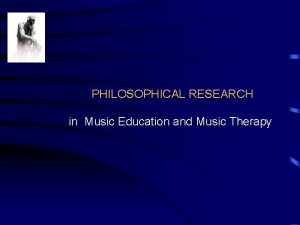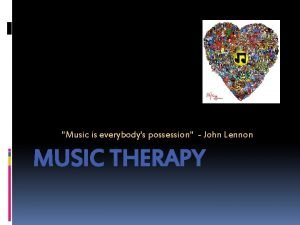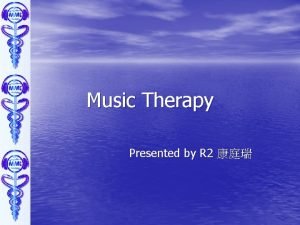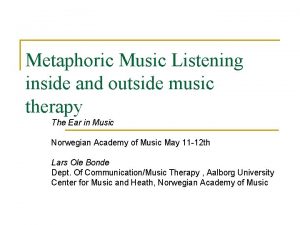The American Music Therapy Association Making the Most


















































- Slides: 50

The American Music Therapy Association Making the Most of Your AMTA Membership

The Mission of AMTA To advance public awareness of the benefits of music therapy and increase access to quality music therapy services in a rapidly changing world.

Background n Founded in 1998 through the unification of the National Assoc. of Music Therapy (est. 1950) and the American Assoc. of Music Therapy. (est. 1971) n More people come to know about music therapy through the work AMTA does n AMTA builds public awareness of the profession through its website, media articles, research dissemination, therapist referrals, etc

Where Do I Get Involved? n Work of the association is done by members YOU State Associations AMTA Regional Associations AMTAS Regional Student Associations Student MT Groups & Clubs

AMTA Structure The work of the association is done by members MEMBERS Board of Directors Additional Boards: ETAB Ethics, Judicial Review Student Affairs Executive Director Council on Education & Clinical Training Council on Professional Practices Council on Association Services National Office Staff Committees Assembly of Delegates Regions Ad-hoc Committees Regional Executive Boards

Council on Education & Clinical Training Contains the following Committees: Academic Program Approval n Association Internship Approval n Continuing Education n

Academic Program Approval Committee GOALS: n 1. To support the establishment and maintenance of standards of excellence for education and clinical training in the field through collaboration with appropriate association bodies (e. g. other national committees and the Education and Training Advisory Board). n 2. To utilize these standards as evaluative criteria for recommending approval for academic institutions upon initial application and review, and every ten years thereafter in conjunction with the NASM accreditation/affirmation review.

Association Internship Approval Committee GOALS: n 1. To establish, maintain and improve standards for the training of music therapists participating in AMTA programs on the National Internship Roster. n 2. To encourage and assist persons in their clinical preparation for music therapy practice.

Continuing Education Committee GOALS: n 1. To ensure that the continuing education courses offered by AMTA adhere to the guidelines established by the Certification Board for Music Therapists. n 2. To promote the value of board certification and strive to provide continuing education opportunities that meet the educational needs of the members of AMTA.

Council on Association Services Contains the following Committees: Affiliate Relations n Clinical Practice Networking n Diversity & Multiculturalism n International Relations n Membership n Professional Advocacy n Workforce Development & Retention n

Affiliate Relations Committee GOALS: n 1. To build connections between AMTA members and their colleagues in affiliate organizations n 2. To increase knowledge of music therapy among professionals in affiliate organizations

Clinical Practice Networking Committee GOAL: n To provide coordination for networking and mentoring opportunities for practitioners working in a range of settings and with different populations, and to foster communication between committees and with professionals in related fields.

Diversity & Multiculturalism Committee GOALS: n 1. To encourage increased diversity within the population of music therapy professionals and students in the US. n 2. To increase diversity and multiculturalism training and resources for AMTA members. n 3. To provide a support system, including tools and resources, for music therapy professionals and students from diverse groups. n 4. To monitor and recommend revisions to AMTA documents to achieve conformity to accepted language concerning diversity and multiculturalism.

International Relations Committee GOALS: n 1. To facilitate awareness of international opportunities and events by AMTA members, and the inclusion of international perspectives of music therapy in AMTA n 2. To assist the President of AMTA with matters concerning the World Federation of Music Therapy (WFMT), such as facilitating communication and the distribution of information n 3. To assist international students n 4. To facilitate awareness of music therapy among disciplines, organizations and professionals in other countries n 5. To work with national conference planners to insure inclusion of events that represents a diverse ethnic music focus

Membership Committee GOALS: n 1. To insure the growth and development of AMTA by determining ways to increase membership. n 2. To promote the value of all categories of AMTA membership. n 3. To evaluate the needs of AMTA members.

Professional Advocacy Committee GOALS: n 1. To advocate for the professional representation of the field of music therapy. n 2. To assist membership in responding to misrepresentation of music therapy in the media and in public.

Workforce Development & Retention Committee GOALS: n 1: To increase awareness among diverse groups of students as to music therapy as a career choice. n 2: To explore the potential of developing a retention plan n 3: To create channels for communication with the AMTA Member ship regarding topics of workforce development and retention

Council on Professional Practices Contains the following Committees: Government Relations n Reimbursement n Research n Standards of Clinical Practice n Technology n

Government Relations Committee GOAL: n To increase access to quality music therapy services through monitoring and responding to state and federal legislation that impacts music therapy practice and/or impacts healthcare and education service delivery to current and future music therapy clients.

Reimbursement Committee GOAL: n To increase access to music therapy services by increasing the percentage of music therapy services receiving reimbursement.

Research Committee GOALS: n 1. To encourage and promote research of all types of research methodology in music therapy. n 2. To take complete responsibility for the research sessions at annual national conferences.

Standards of Clinical Practice Committee GOAL: n To develop, assess, and update the AMTA Standards of Clinical Practice.

Technology Committee GOALS: n 1. To educate the AMTA on the current clinical technology resources, practices, and applications in use by its members n 2. To serve as a technology resource for AMTA members n 3. To promote technology-related events and training at AMTA national and regional conferences n 4. To support the membership of the AMTA in their uses of current and emerging clinical and related technologies.

Membership Categories n n n n n Professional Associate Student (undergraduate) Graduate Student Retired Professional Inactive Music Therapist Patron Affiliate Organization Honorary Life

Professional Membership n For practicing music therapists and interested professionals n All publications (Journal of Music Therapy, Music Therapy Perspectives, Music Therapy Matters Monthly) n Member Area of website n National and Regional privileges of voting and holding office n Other discounts and benefits

Associate Membership n Designed for non-music therapists who want to support the mission of AMTA n Professional level, non-music therapist membership n Same benefits of membership as Professional except the right to vote and hold office n Associate members are also members of regions

Student/Grad Student Membership n For full-time students n Does not include voting privileges nor the right to hold n n office at the national level Other member benefits the same as Professional - at less than half the cost Members are automatically members of AMTAS as well as the region in which they reside (based on primary mailing address) Can serve as student liaison to AMTA committees Can run for and hold office in AMTAS

Other Membership Categories n Retired – professional members 65 and older n Inactive – for professional music therapists who are not currently working due to illness, job loss, raising a family, etc. (must meet criteria and apply each year) n Patron – for organizations, institutions, firms, foundations contributing substantial sums to AMTA n Affiliate – any organization interested in supporting the aims, objectives and purposes of AMTA

Regional Membership n 7 regions: Great Lakes, Mid-Atlantic, Midwestern, New England, Southeastern, Southwestern, and Western n AMTA members are automatically members of the region which their primary mailing address indicates when they join AMTA n A portion of AMTA dues goes to each region for regional membership n If you move to a new regional area, your regional membership will change

AMTA Regions Midwestern Great Lakes Western New England Mid Atlantic Southwestern Southeastern

AMTAS (American Music Therapy Association Students) n Student organization within AMTA n Student and Grad Student members are automatically members of AMTAS when they join AMTA n Student/Grad members can vote and hold office within AMTAS and in regions where regional bylaws allow n Student Affairs Advisory Board (SAAB) and student liaisons to some committees provide representation in AMTA even though students don’t vote in professional member national elections

Benefits for Students Using your AMTA membership to aid your transition to Professional Music Therapist

AMTA Member Toolkit n School and Internship Site listings n Average salaries and demographic information to help you set fees and negotiate salaries when you start a job (Workforce Analysis found in Job Center) n Networking: Access to listings of professionals working in a specific population or setting or area of the country n Official documents: familiarize yourself with the Code of Ethics, Standards of Practice, etc.

Member Toolkit n Job Center Resources n Podcasts n CPT Code Information Sheet n Fact Sheets by Population n HIPAA Q/A n Copyright information n Tips for Advocacy work n And much more…

Student Scholarships n E. Thayer Gaston Writing Competition awards $500 for undergraduate students n Edwina Eustis Dick Scholarship awards $500 for Music Therapy Interns n Brian Smith Memorial Scholarship awards $500 for Music Therapy Interns pursuing training in chemical dependency or adolescent programs

Student Scholarships n Christine K. Stephens Professional Development Scholarship awards 1 Health. RHYTHMS training to music therapy students n Theodore Meyer Scholarship awards $1000 cash scholarship to undergrad/equivalency students or interns annually n AMTA Student Conference Scholar 2 awards annually incl. free conference registration, participation in CMTEs & Institutes plus $250 cash for conference expenses

Publications n Journal of Music Therapy – 4 issues - current music therapy research and theory (both in-print and online subscriptions) n Music Therapy Perspectives – 2 issues - focus on music therapy practice, as well as academics and administration (both in-print and online subscriptions) n Music Therapy Matters Monthly – monthly email to your in-box, in-house newsletter focusing on AMTA business and activities, current happenings in the allied health field, employment trends and opportunities, and topical items of general interest about music therapy

Discounts AMTA members enjoy discounts on a variety of products and publications including: n AMTA products n Books (can purchase AMTA-published textbooks n n through AMTA at the member discount rather than at your school bookstore price) AMTA national conference registration AMTA regional conferences registration Online e-courses (with CMTE credits earned) Oxford University Press - 25% off their wide selection of publications for AMTA members

Networking and Communication n Mentorship/networking with others who are working – how to start a private practice, best interventions with specific populations, best place to purchase instruments, etc. n Attending regional and national conferences helps you get to know students at other schools and develop a peer network n Conferences are also good opportunities to meet prospective clinical training directors n Members can purchase discounted cost mailing lists of members to conduct surveys and gather information for research, masters thesis, etc.

AMTA Website n Educates the public about music therapy n You have to answer the question ‘what is music therapy’ less because of the advocacy work AMTA does n Conference and association business updates n Legislative updates and calls-for-action n Internship and recruitment page listings

Member Area of Website www. musictherapy. org Join AMTA and your email address and password allows you to get: n AMTA Member Handbook n AMTA Professional Opportunities listing n Resources for private practice n Government relations updates n Committee pages – with updates on the committee work and information and links to related organizations n Music Therapy Matters Monthly n Scholarship and Award information n Lists of committees and contact information

Benefits for Interns In addition to those already discussed:

Benefits for Interns n Interns may join as Professionals if they wish by may also n n n remain Student members through the end of the year in which they finish their internship Low cost “Student” membership while you are an intern Listing AMTA membership on your resume shows you are committed to the profession and are keeping up on the latest trends “Welcome to the Profession” packet – apply in the 3 rd month of your internship, includes coupons for membership, conferences and products as well as lots of good information for new professionals Access to the member area for job listings AMTA members are referred to those contacting the national office for service providers Archived access to ALL association journals for research purposes

Benefits for Professionals In addition to those already discussed:

Benefits for New Professionals n Membership Listing – stay in touch with friends from n n school, network with other professionals in your same setting or population Workforce Analysis – negotiate with facility administrators for new jobs in music therapy using Statistical Information included Additional Continuing Education opportunities – dispersed through ENews, Regional and national websites, listservs Vote in national/regional elections, sit on committees, run for office Learn about trends in the profession – reimbursement, new treatment interventions, ways to work with populations, etc

Benefits for New Professionals n Liability insurance connections offered to members n National office staff available to help with questions: private practice, reimbursement, starting a new program, etc. n Committee chairs and members can also be contacted for specific questions n Continuing education opportunities – to gain CMTE credits for MT-BC recertification n n E-courses Podcasts

Professional Scholarships n Florence Tyson Grant to Study Music Psychotherapy for professionals doing postgraduate training in music psychotherapy n Anne Emery Kyllo Scholarship supports professional music therapists in their efforts to expand their training in continuing education opportunities n AMTA Conference Scholar & Past Presidents’ Conference Scholar provides professional music therapists financial support for National Conference

Professional Grants n Arthur Flagler Fultz Research Award $15, 000 – promotes the exploration of new and innovative music therapy treatments, assess efficacy to help define best practice, and assess role of music therapy in emerging health care delivery models n Research Committee’s Clinician-Based Grant Program (up to) $5, 000 promotes and funds research in support of applied clinical research incorporated into routine fieldwork

Your Membership Helps Support the Music Therapy Profession Articles on TV and in print don’t just happen. They come out of hundreds of hours of advocacy performed by AMTA members, committees and staff. More people each year know about music therapy and its benefits because of the support of each and every AMTA member. Together we can help make AMTA’s mission possible: to advance public knowledge of music therapy benefits and increase access to quality services for those who need them.

Everyone Plays a Vital Role in the Association n Where do you fit in? n Get involved n Present at conference n Speak at a high school career day n Run for office or sit on a committee n You are necessary in the mission of AMTA because together WE are AMTA. n AMTA is all of us.
 Music music music
Music music music Psychoanalytic therapy is to as humanistic therapy is to
Psychoanalytic therapy is to as humanistic therapy is to Bioness integrated therapy system occupational therapy
Bioness integrated therapy system occupational therapy Psychoanalytic therapy is to as humanistic therapy is to
Psychoanalytic therapy is to as humanistic therapy is to Music therapy thesis statement
Music therapy thesis statement Thayer gaston
Thayer gaston Cpt code for music therapy
Cpt code for music therapy Integrative health through music therapy
Integrative health through music therapy Bachelor surber
Bachelor surber Layers of neurosis in gestalt therapy
Layers of neurosis in gestalt therapy Florida occupational therapy association
Florida occupational therapy association Classical music vs romantic music
Classical music vs romantic music It refers to the number of individual musical lines
It refers to the number of individual musical lines A music that employs electronic musical instruments
A music that employs electronic musical instruments Pamulinawen musical elements
Pamulinawen musical elements The american institute for cognitive therapy
The american institute for cognitive therapy Mosc apta
Mosc apta Many mumbling mice
Many mumbling mice Making beautiful music together
Making beautiful music together Jamiroquai virtual insanity video making of
Jamiroquai virtual insanity video making of What is inferring
What is inferring War making and state making as organized crime
War making and state making as organized crime Biomedical therapies are provided by
Biomedical therapies are provided by History of sarswela in the philippines
History of sarswela in the philippines Asma math contest
Asma math contest Colbert, stephen. home page. 1 nov. 2006.
Colbert, stephen. home page. 1 nov. 2006. Galvanize it
Galvanize it The added value endowed on products and services is the
The added value endowed on products and services is the The american heart association recommends child cpr for
The american heart association recommends child cpr for American berkshire association
American berkshire association American baking association
American baking association How to do text citations
How to do text citations American psychological association (apa) style adalah
American psychological association (apa) style adalah American psychological association example
American psychological association example Aha cpr in schools training kit
Aha cpr in schools training kit American alzheimer's association
American alzheimer's association American library association
American library association Nymhca
Nymhca North american gaming regulators association
North american gaming regulators association North american association for environmental education
North american association for environmental education American library association
American library association American pyrotechnics association
American pyrotechnics association American psychiatric association annual meeting 2020
American psychiatric association annual meeting 2020 American association on health and disability
American association on health and disability American angus gestation calculator
American angus gestation calculator American thyroid association guidelines pregnancy 2017
American thyroid association guidelines pregnancy 2017 American gas association
American gas association Mobile baptist association
Mobile baptist association American academy of private physicians
American academy of private physicians American nurses association illinois
American nurses association illinois Roberta carlin
Roberta carlin
